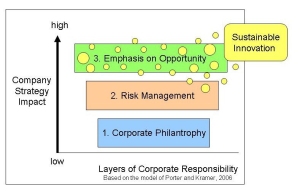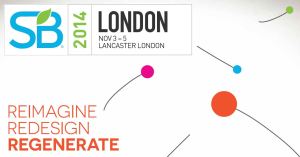Filed under: Best Practices in The Netherlands | Tags: Critical Factors, Definitions, Entrepreneurship, Innovation Processes, SME, Sustainable Innovation
Not only the large companies, but also Small and Medium Sized Companies (SMEs) may very well profit from sustainably innovation. It increases competative advantage, reduces (production) costs and improves social and environmental impact.
Hilke Bos-Brouwers, of the ‘Vrije Universiteit’ in Amsterdam in The Netherlands, recently presented theses conclusions of her PHD research.
Based on her extensive research among 1056 Dutch SME companies (< 250 employees), Mrs Bos-Brouwers concluded that SMEs innovate in a sustainably way, but slightly different as compared to larger entreprises. Innovations are often incremental, very pragmatic and type of innovation can vary per industry sector.
Hilke Bos-Brouwer has identified seven critical factors that, significantly contribute to the success of sustainable innovation in SMEs : (1) Obligations, (2) Trained employees (3) Suppliers (4) Industry groups (5) Degree of formalisation (6) Customer (needs) (7) Government.
Bos-Brouwer also brings up a list of (partly new) and definitions that may be helpful. Some of them translated in English :
- Sustainable Development : development that meets the needs of the present without compromising the ability of future generations to meet their own needs (definition Commission Brundtland, 1987).
- Sustainable Entrepreneurship : integrating environmental, social and economical aspects in the core business of the company, on a volontairy basis, whereby stakeholders needs and supply chain cooperation is regarded key to improve the company results on the short and middle term.
- Innovation : renewing or improving products, services, technical and organisational processes or marketing strategy ; the novelty of the innovation can be related to the industry sector or market.
- Sustainable Innovation : renewing products, services, technical, organisational processes or marketing strategy in such a way that the economical performance as well as the environmental impact and the social impact, on the short and the long term, are taken into consideration, .
- Sustainable Innovation Processes : decision making, design and implementation processes that guide sustainable innovation projets
Sources : (1) http://www.stichtingmilieunet.nl/andersbekekenblog/duurzaam/duurzaam-innoveren-winstgevend-voor-mkb-by-hilke-bos-brouwers.html and (2) press release [PWC-MEDIA] ‘Persbericht VU – Duurzaam innoveren winstgevend voor MKB’, 3 september 2010, Free university of Amsterdam
Filed under: Sustainability in France | Tags: Consumer Attitude, French Exemples, French Government, Media, Opinionway, Public Opinion, Sustainable Innovation
The French market research agency ‘Opinionway’ concludes that a majority of French people considers that ‘there is not enough information in the media on Sustainable Development’ .
Opinionway survey unveils French public opinion about role of media
Opinionway recently presented its study ‘Média et développement durable’ on the 26th of May. The study has been conducted end of May 2010 and was based on computer assisted web interviews with 1055 participants of 18 years and older in France.
57 % of the French people consider the current information in French media on Sustainable Development as ‘insufficient’. As well, the quality of the information is being disputed : only 33 % believes the quality of the information is ‘good’ or ‘quite good’.
Who is responsible for Sustainable Development ?
In 2010, French people are less convinced about who carries the main responsibility for Sustainable Development. Whereas in 2009 70% of the people agreed that ‘Sustainable Development is everybody’s responsibility’, this year only half of the people agreed with the statement. The responsability enterprises if confirmed by only 51`% (down from 61%), the role of the media to provide complete and correct information was confirmed by only 43% (down from 51%). In 2009 50% of the French people believed the public authorities should drive the a sustainable policies, where as in 2010 only 36% agrees with this statement.

Assumed roles and reponsibilities of ‘everyone’, ‘entreprises’, ‘media’ and ‘public authorities’.
Preferred information sources are online sites and specialised magazines
Being asked about the preferred media for finding adequate information, a large majority (82%) responds that they search for specialised magazines (82) and online information (70%) , over information via the radio (66%), in the daily press (65%) or on the television (49%).

Preferred media channels to find information on Sustainable Development
All age groups prefer the Internet (76%) for finding information on Sustainable Development and just 38% look or listen in the daily press, the radio or the television. The people with 50+ years look for books (20% and 23% in age groups 50-59 and 60+,and only13 to 16% in the younger age groups). As of the age of 35 the role of personal relations increases to find adequate information.

Differences in first choice media channel by age group
No unanymous expectations about the role of the media
The supposed role of the media remains divided. 31% believes the media should report factually (down from 34%). 30% underlines the obligation of the media to alert catastrophes (down from 37%). 30% believes the media should launch the debate and controversies (almost the same as in 2009). 26% believes the media have an pedagogical role.

No unanymous declared role for the media (factual information, information on catastrophes, launching the debate, educational role)
Discussion
The study of Opinionway offers a snapshot of sentiments. It does not provide answers why people seem to be less satisfied with the levels and quality of media information. Neither it comes up with suggestions of actions to be taken.
Following the public debate in France however, we could find however some traces and developments that support Opinionway’s Conclusions, as well define recommendations for actions to be taken.
Why has the initial enthousiasm been tempered ?
The optimistic tone of voice in 2007 and 2008 has changed into a more and more sceptical one. I wonder : Why do people feel ‘saturated’ on the topic ? Why are they dissatisfied about the level or quality of information ? Could there be an ‘information overkill’ ? Has Sustainable Development been ‘overhyped’ ? Probably. Does it has to do with the economical crises ? Maybe. Is it an exemple of the maximum lifecycle of a ‘consumer hype’, which just fades away.. ? Hereby some reasons why public opinion seems to have changed :
- Saturation of Information : In the last year, information on Sustainable Development is presented everywhere. IFOP concluded early 2010 that French people experienced a sense of ‘saturation’ of Sustainable Development Information in the media. There may be much information out there, but it is not regarded as sufficiently adequate nor sufficiently targeted.
- Disappointment about Copenhaguen : As the high expectations for the Copenhague summit in December 2009 were not met, the conference was immediately regarded as a failure in the press. Hardly any attention was paid to the fact that for the first time in history world leaders start to discuss first steps to attack the world economical, social environmental issues.
- Eco-sceptic people get attention : The eco-sceptical book of Claude Allègre ‘l’Imposture climatique ou la fausse ecologique’ has drawn much attention in France. Mr Allegre disputes the statements of climate change due to human intervention. Apart from the fact his book is disputed all over, it leaves some people with the feeling that ‘all ecologists are liars’.
- The French government has started in a tremendous way in 2007 ‘Grenelle d’Environnement’, with round tables and representatives of all civilian, employers, employees and NGOs resulting in a new series of laws like the Grenelle 2 laws and more specificly extended CSR reporting requirements and Eco-labels on products. The process has been tougher than expected. Some groups believe the Grenelle 2 is by far not ambitious enough. Unfortunately putspeaking NGO’s like the Nicolas Hulot Foundation have left the round table discussions.
Which actions to be taken ?
Fortunately, numerous entreprises and public organisations have started their Sustainable Development and CSR programs, new green product development schemes and mobilisation of employees. They are all taking responsibility as their partners, the government and their customers (entreprises ánd consumers) ask for it.
I firmly believe that companies and governmental institutions should continue to show positive exemples. Positive examples are key to keep employees motivated. New achievements should be actively promoted as a counter-poison to the negative stories that turn around. Exemplary municipalities, successful green and social businesses, intentive civilians : they all should be highlighted and promoted. Exemples should be realistic, specific and ambitious.
I hope the Best Practices presented in this blog, and my consultancy activities, give a positive impulse to this change : Look at these companies and public organisations : they are all successful, serve their customers in an excellent way ánd take responsibility for a greener, social and healthy world !
Source : 1. http://www.opinion-way.com/pdf/2010_les_francais_le_dd_et_les_medias_(2).pdf
Filed under: Best Practices in France | Tags: Corporate Philantrophy, Emphasis on Opportunity, Risk Management, Sustainable Innovation
French Industry Testing the Waters with Sustainable Innovation.
What is the role of Corporate Responsability in French entreprises ?
Corporate Philanthrophy is wide-spread Many French enterprises have their ‘Mécanat’ or Foundations. They contribute to the international community with projects in culture, research, sports. Projects of choice seem not always to have a relation with the Company Strategy. Foundations tend to perform at an arm-lengths distance of the mother company.
Risk Management becomes common : Most large French companies have now implemented practices to comply to environmental and social norms set by international organisations, national government or industry sector organisations. Many companies participate in environmental audits. Main reasons are of a defensive kind: Avoiding negative publicity and keeping a positive corporate image. Examples are the UN Global Compact , ten United Nations principles for human rights, labour, environment and anti-corruption, the UN Global Reporting Initiative or ‘GR3’a s guidelines for transparent, accessible and comparable socio-environmental reports.
Corporate Responsibility increasingly seen as an opportunity. The Risk Management activities help companies to become aware of environmental, social and economic impact. This creates a starting point for developing concepts of improvement. However, innovation flourishes only then, when there is an Emphasis on Opportunity. The 3rd level of CR. Here, Sustainable Development becomes embedded in Corporate Strategy.

Innovation flourishes when CR is seen as an ’Opportunity’, inspirered by the model of Porter and Kramer, 2006 (1).
Innovation on Customers Request. The interviewed Directors Sustainable Development recognize that customers ask for sustainable solutions. Sustainable solutions are now labelled as part of the competitive advantage. Soon, however, customers will no longer accept any products of which the origin can not be traced, the carbon footprint is not known, the energy use can not be measured, etcetera..
Evolution or Revolution ? Incremental innovation can change the business. Products become more efficient and performing. At the very same time complete new businesses are being created, within corporate companies as well as through start ups. Both developments should be encouraged. Question is : Do we need a Revolution ?
Eugène Delacroix (1830) (2)
Sources : 1. ‘Strategy & Society : The link between competative advantage and corporate social responsability’, by M. Porter and M. Kramer in Harvard Business Review, 12/06 and 2. Peinture of Eugene Delacroix (1830), ‘La liberté guidant le peuple‘, Louvre Paris.









